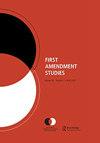你不能阻止我:当社交媒体空间成为公共论坛时
Q2 Social Sciences
引用次数: 2
摘要
自成立以来,Facebook和Twitter等社交媒体空间在法律上一直被视为不受美国宪法第一修正案保护的私人空间。这是正确的,因为(正如许多人忘记的)第一修正案适用于政府行为者、行动和公共空间,而互联网不在其中。然而,在2018年,奈特诉特朗普案的裁决有利于原告,通过公共论坛原则将第一修正案的保护扩展到那些寻求(但被阻止)参与特朗普总统推特账户讨论的人。全国各地还有许多类似的案例发现,使用社交媒体与选民沟通的公职人员建立了一个指定的公共论坛。因此,他们不能通过阻止(不允许)一些公众成员进入这个空间来选择谁可以进入这个空间,因为这构成了观点歧视。这一决定对于将论坛原则带入技术时代具有重要意义,它为民主审议开辟了重要空间。本文解释了奈特诉特朗普案中社交媒体空间被视为公共论坛的具体要求,描述了将其作为先例的相关案例,并探讨了与此案相关的影响和未解决的问题。本文章由计算机程序翻译,如有差异,请以英文原文为准。
You can’t block me: When social media spaces are public forums
ABSTRACT Since their inception, social media spaces such as Facebook and Twitter have been legally considered private spaces that are not subject to the protections of the First Amendment. Rightly so, for (as many forget) the First Amendment applies to government actors, action, and public spaces, and the Internet is not one of those. However, in 2018, the Knight v. Trump ruling in favor of plaintiffs extended First Amendment protections via the public forum doctrine to those seeking access to (but who have been blocked from) participating in discussions on President Trump’s Twitter account. Numerous other similar cases across the country have found that public officials who use social media to communicate with constituents have established a designated public forum. They therefore cannot choose who is allowed into that space and who is not by blocking (disallowing access for) some members of the public, because this constitutes viewpoint discrimination. This decision is important in bringing forum doctrine into the technological age, and it opens important spaces for democratic deliberation. This article explains the specific requirements for a social media space to be considered a public forum from Knight v. Trump, describes related cases that are using it as a precedent, and explores the implications and unresolved issues related to this case.
求助全文
通过发布文献求助,成功后即可免费获取论文全文。
去求助
来源期刊

First Amendment Studies
Social Sciences-Law
自引率
0.00%
发文量
0
期刊介绍:
First Amendment Studies publishes original scholarship on all aspects of free speech and embraces the full range of critical, historical, empirical, and descriptive methodologies. First Amendment Studies welcomes scholarship addressing areas including but not limited to: • doctrinal analysis of international and national free speech law and legislation • rhetorical analysis of cases and judicial rhetoric • theoretical and cultural issues related to free speech • the role of free speech in a wide variety of contexts (e.g., organizations, popular culture, traditional and new media).
 求助内容:
求助内容: 应助结果提醒方式:
应助结果提醒方式:


